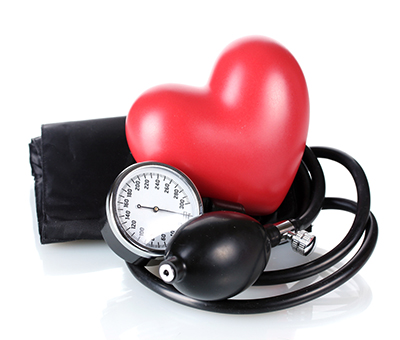 Hypertension or high blood pressure is a condition in which the pressure in the blood vessels is too high. While it is normal for the pressure to vary from time to time (increasing during physical activity, etc.) sustained high pressure is dangerous and can cause long-term damage to the heart and kidneys. Individuals with high blood pressure may have a genetic predisposition to the disorder or it may be a result of contributing lifestyle habits like smoking. Because hypertension is the “silent killer,” warning signs of the disease will most likely be absent. The blood pressure is generally considered normal when the systolic pressure (top number) is less than 120 and the diastolic pressure (bottom number) is less than 80. If your blood pressure is elevated to a certain level your doctor may prescribe medication to help lower your blood pressure. It is often necessary for individuals with hypertension to take multiple medications that work in different ways in order to lower the pressure. In addition to treating hypertension with medications, diet and exercise along with stress management are key in managing hypertension over the long-term.
Hypertension or high blood pressure is a condition in which the pressure in the blood vessels is too high. While it is normal for the pressure to vary from time to time (increasing during physical activity, etc.) sustained high pressure is dangerous and can cause long-term damage to the heart and kidneys. Individuals with high blood pressure may have a genetic predisposition to the disorder or it may be a result of contributing lifestyle habits like smoking. Because hypertension is the “silent killer,” warning signs of the disease will most likely be absent. The blood pressure is generally considered normal when the systolic pressure (top number) is less than 120 and the diastolic pressure (bottom number) is less than 80. If your blood pressure is elevated to a certain level your doctor may prescribe medication to help lower your blood pressure. It is often necessary for individuals with hypertension to take multiple medications that work in different ways in order to lower the pressure. In addition to treating hypertension with medications, diet and exercise along with stress management are key in managing hypertension over the long-term.
Eat Well to Lower Blood Pressure
A healthy diet for lowering blood pressure is much more than just limiting salt. A healthy diet full of the right nutrients can help to significantly lower blood pressure.
Eat the Right Amount of Sodium
Sodium is a nutrient that is often misunderstood, and the salt shaker seems to get the blame for everyone’s high blood pressure. It's important to eat the right amount of sodium.
